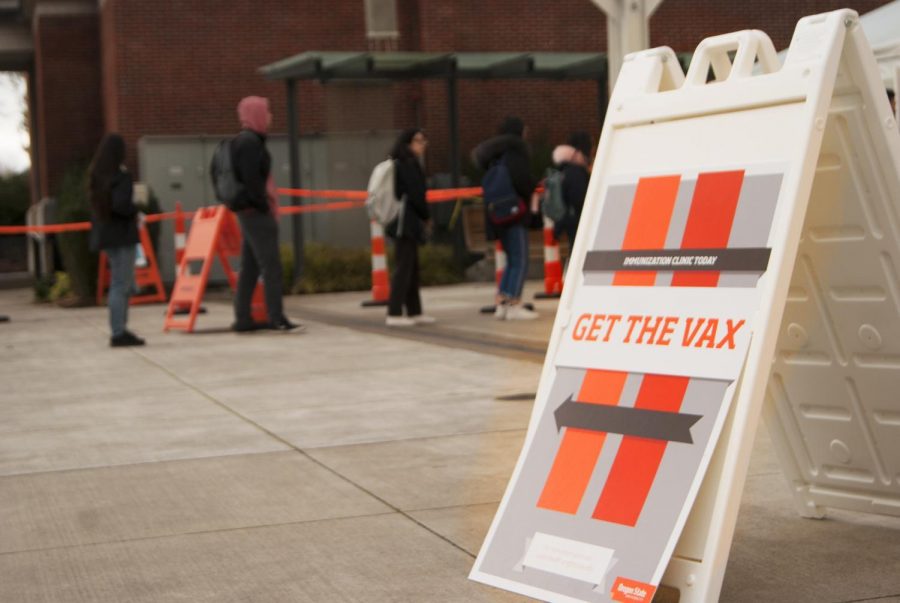Around 6,000 students receive meningococcal B vaccine through clinic
January 22, 2018
Students must wait 28 days to receive second dose.
From Jan. 9-13, a giant white tent took up a good portion of the Student Experience Center Plaza. Arrows in blues and reds pointed students towards the Memorial Union basement or ballroom. Students left the area in about an hour, perhaps rubbing an arm or crinkling a graham cracker wrapper.
The Oregon State University meningococcal B clinic lasted through week one of winter term. Its mission? To vaccinate as many students under 25 years of age as possible against MenB.
According to Jenny Haubenreiser, the executive director of Student Health Services, approximately 6,000 students received their first dose of the MenB vaccine by Friday, Jan. 12. A portion of the student population had already received their vaccines through SHS during previous clinics or off-campus.
“We also know that many students have been vaccinated before on campus, and also vaccinated by off-campus medical care providers and pharmacies,” said Steve Clark, vice president of University Relations and Marketing, in an email. “We are in the process of receiving and compiling documentation to ascertain how many students have received either their first doses or completed their full vaccinations.”
Students who receive their vaccinations off-campus are required to provide documentation of their vaccination records to the university, according to Clark.
“OSU has made a concerted effort to have students get their vaccine on campus or find a pharmacist or health care provider to receive vaccinations off campus,” Clark said in an email. “Students getting MenB vaccines off campus do need to provide their vaccine verification information to Student Health Services immediately so their record of vaccination can be documented.”
According to Haubenreiser, the main challenge is getting students into the clinic.
“Really, it’s getting students to come in and get their vaccine. Supply is not an issue,” Haubenreiser said via email. “There are many misconceptions related to insurance or how the vaccine works.”
A secondary clinic will be organized in February to provide the second dose of MenB vaccine, according to Haubenreiser. Students have to wait at least 28 days until they can receive the second dose.
According to the SHS Immunizations policy webpage, both national and international students are required to have certain vaccinations, such as the measles, mumps and rubella vaccine and the Tdap vaccine—tetanus, diphtheria and pertussis.
“Students coming through the OSU clinics have been very positive about the university’s response and the vaccination program,” Clark said in an email. “Since OSU has been working to vaccinate students for over a year now, many students realize that being vaccinated will help protect them from a serious disease.”
On Sunday, January 14, 2018, a Linus Pauling student was hospitalized with a confirmed case of meningococcal disease, according to Brenda Downum, the Corvallis School District communications coordinator.
“Local health officials are investigating this case thoroughly and are working with medical providers, family, and the school district to identify anyone who may have had enough close exposure to need preventative treatment,” said Downum as of the morning of Wednesday, Jan. 17.
According to Downum, this medical case has been found to be unrelated to the MenB outbreak at OSU.
Charlie Fautin, the deputy director of the Benton County Health Department, added that despite the delay the Dr. Martin Luther King Jr. three day weekend provided, officials were able to quickly attend to the case.
“We do kind of a CSI practice, we look back at this case and use backtracking. Who classmates are, where they live, where any siblings or parents have been, where they’ve been in school and out of school,” Fautin said. “What we’re after is two things. One is where the disease came from, where they caught it. Two is to find everyone who may be infected by this person and prevent any further spread of infection.”
According to Fautin, the best way to prevent infection is by getting antibiotics.
“One important factor is that this disease is transmitted by sneezing and coughing, sharing eating and drinking utensils,” Fautin said. “It’s important for people to understand that this is not as contagious as cold or flu. It takes pretty extended face-to-face contact to infect.”
According to the SHS meningococcal fact sheet, meningococcal B is a serious infection caused by the N. menigitidis bacterium that affects the brain, spinal cord and blood. Meningococcal B is one of 13 strains of the N. menigitidis microbe, and is responsible for 38 percent of meningococcal cases in Oregon. Routine meningococcal vaccines cover groups A, C, W and Y.
“There is also confusion about the different types of meningococcal vaccines—only one type of vaccine helps prevent MenB,” Haubenreiser said in an email. “If you’ve had the meningococcal quadrivalent MCV4 vaccine in the past, it will not protect against MenB. This is a different strain.”
According to Clark, students can get all questions answered at the official OSU MenB page: getthevax.oregonstate.edu.
























































































































